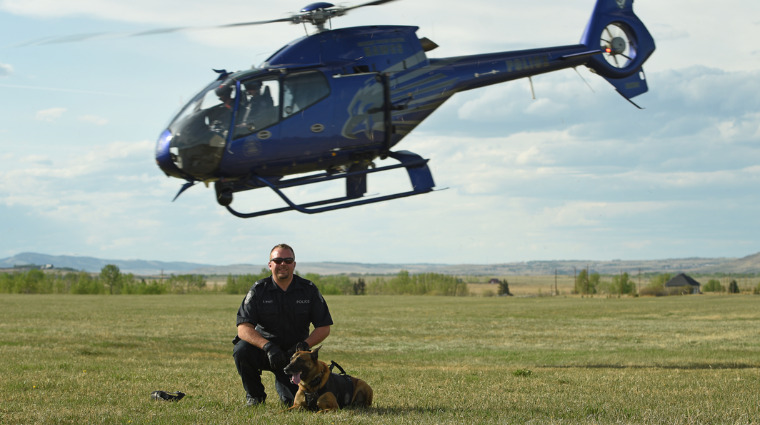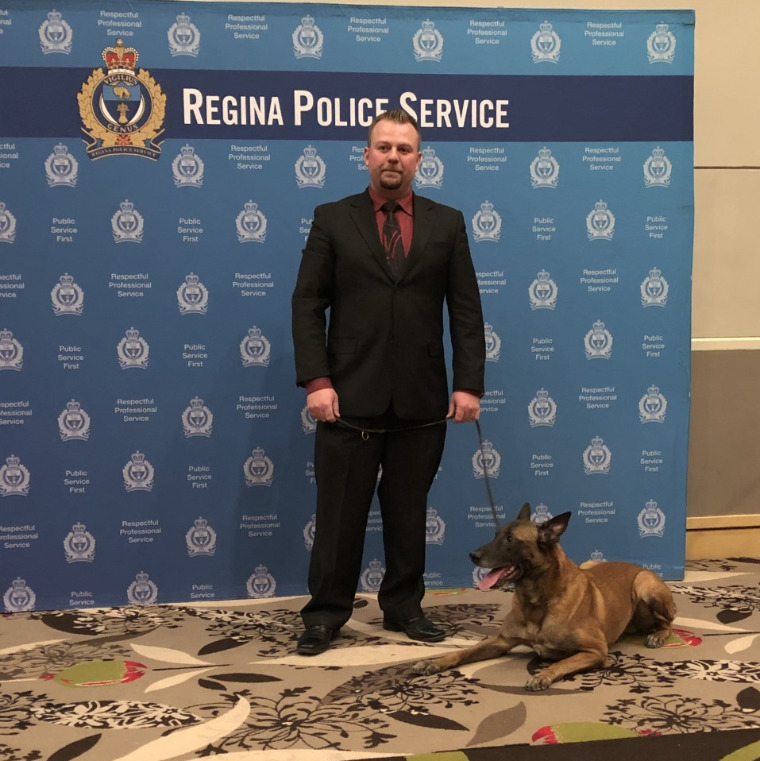
Learning from someone who has firsthand experience working in the field can offer a unique perspective. Saskatchewan Polytechnic Justice Studies diploma students know this is true, as one of their instructors, Cpl. Steven Wyatt, is also an officer with Regina Police Service (RPS). From gaining practical knowledge of the criminal justice system to understanding the challenges and complexities of law enforcement, Justice Studies students gain invaluable insight from Wyatt.
Wyatt has been policing for two decades. He has had a well-rounded career working in uniform, plain clothes, with canine support and most recently with RPS’ new air support unit.
“I’ve been very fortunate along the way; I’ve been able to experience many aspects of policing. I bring well-rounded experience into the classroom to give students a real-world perspective on what justice is all about. I can paint a picture of what policing looks like in the real world – from public speaking with the canine unit, to responding to 911 calls and working with lawyers in the court room,” shares Wyatt.
Wyatt says that his policing experience informs what he teaches in the classroom. “We do a lot of role-playing in class. For example, maybe the students will role-play as a suspect with addictions. This allows them to see both sides of the coin and helps develop empathy.”
Sask Polytech’s Justice Studies program is two years. After year one students choose their specialty: correctional studies or Indigenous policing foundations. Students have the opportunity to participate in a ride along during their studies with RPS or Saskatoon Police Services so they can experience what the actual job is like before picking a specialty. All students receive a formal education on the criminal justice system, including the Youth Criminal Justice Act, restorative justice and interpersonal violence. Students also learn soft skills including writing, public speaking, problem-solving and time management to help prepare them for their future careers.
“At Sask Polytech, we teach the tools you need to do the job,” says Wyatt who started teaching with the Justice Studies program in September 2022. “Training at Sask Polytech is very applicable.”
Wyatt is a lifelong learner and brings this joy of learning to his students. “Policing is evolving, you have to keep learning. I have a passion for learning new information and sharing it in the classroom. I never want to stop learning.”
That passion for learning is what inspired Wyatt to get his pilot’s license and apply to join the RPS air support unit this winter. “I grew up in Moose Jaw. I think every kid in Moose Jaw grows up watching the Canadian Forces Snowbirds fly across the skies. Now I’m a pilot, it’s incredible! I learned a new skill and I’m able to use this knowledge to help protect the citizens of Regina and Saskatchewan.”
The RPS air support unit has two pilots, Wyatt and his colleague Cpl. Chad An derson. Wyatt explains there is one pilot in the sky and one tactical flight officer
equipped with a high-tech camera system. The pilot flies the airplane and the tactical
flight officer facilitates the police function of the flight. “It’s like having a
patrol vehicle in the sky, it gives RPS a different vantage point and increases public
and officer safety.”
derson. Wyatt explains there is one pilot in the sky and one tactical flight officer
equipped with a high-tech camera system. The pilot flies the airplane and the tactical
flight officer facilitates the police function of the flight. “It’s like having a
patrol vehicle in the sky, it gives RPS a different vantage point and increases public
and officer safety.”
Wyatt is excited for his new role with RPS and the new experiences he will be able to bring to Justice Studies students in the classroom.
“I really enjoy teaching and I highly recommend the Justice Studies program. We provide the knowledge and skillset that potential employers are looking for when they hire police officers or correctional officers. By completing this diploma you are setting yourself up for success with a future career in justice.”
Learn more about the Justice Studies program.
Many full-time programs still have available seats for fall 2023. Find a program and apply today.
Published March 2023.

